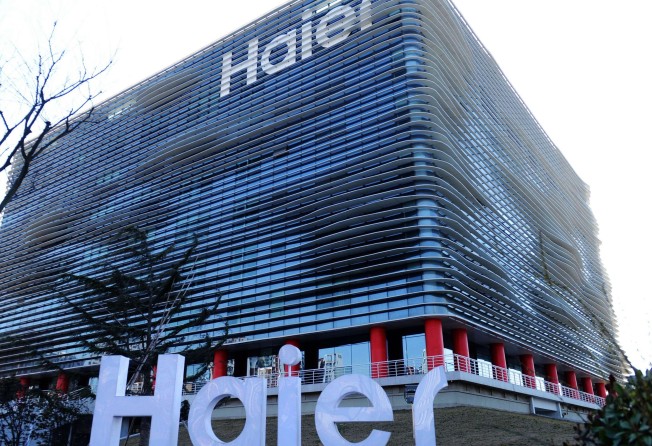China’s top investors bet on first-half star stocks to shine throughout year
HSBC Jintrust Fund Management and China Universal Asset Management say they will retain or even add to their holdings of big, low-valuation stocks

China’s top fund managers say they will rely on the stocks that rose the most in the first six months as their major holdings throughout the year, even as those shares start the second half as the worst performers.
While some investors take profits from the companies that performed best between January and June and rotate into beaten-down growth stocks, HSBC Jintrust Fund Management and China Universal Asset Management say they will retain or even add to their holdings of the big, low-valuation stocks. Concerns that those shares had risen too much are misplaced, they say.
Blue-chip companies including Hangzhou Hikvision Digital Technology and Qingdao Haier have retreated at least 6 per cent since in July after climbing more than 20 per cent in the January-to-June period.
“Most of the blue-chips have only entered the territory of reasonable valuations and there’s no bubble,” said Shi Xingtao, a Shanghai-based fund manager at HSBC Jintrust. “Blue-chips in consumer and financial industries still have substantial valuation edges so they present opportunities to further expand valuations in the second half of the year.”
Shi’s HSBC Jintrust Consumption Dividend Fund has returned 23 per cent this year, beating 93 per cent of his rivals, according to data compiled by fund tracker Howbuy.
Indices tracking the biggest companies on the Shanghai and Shenzhen exchanges advanced at least 11 per cent in the six-month period ended June 30, as tight liquidity spurred by financial deleveraging and an intensified crackdown on excessive speculation compelled investors to seek cheaper stocks with a secure earnings outlook. The benchmark Shanghai Composite Index rose 2.9 per cent in the period, while the ChiNext gauge of small-caps slumped 7.3 per cent.
The rally seems to be fizzling out as the second half gets under way, with some funds shifting out of the first-half winners to seek bargains. Hangzhou Hikvision, China’s biggest maker of surveillance equipment, has shed 9.5 per cent since the start of the month after more than doubling in the first six months, while Qingdao Haier, the nation’s largest fridge manufacturer, has slipped 6 per cent after a 52 per cent gain. Liquor maker Wuliangye has declined 4.8 per cent after surging 61 per cent in the first six months of the year.
China Universal Asset’s Lei Ming believes the selling is short-lived. “Some companies that present long-term investment values aren’t expensive,” said the Shanghai-based money manager.
Lei, whose China Universal Growth Focus Mixed Fund has outperformed 98 per cent of its peers this year with a 22 per cent return based on Howbuy’s data, says he prefers companies in the consumer service industry, particularly those in the consumer finance area, without naming any specifics. He cited reasons including China’s economic transformation and rising incomes among the nation’s younger generation.
Vatti Corp, a maker of kitchen appliances, and furniture manufacturer Suofeiya Home Collection were among Lei’s top three holdings by the end of the first quarter. Vatti has climbed 44 per cent this year in Shenzhen and Suofeiya gained 45 per cent. Bank of China and Bank of Communications were the only two financial companies in his top 10 holdings in the period, rising at least 7.3 per cent in 2017.
While brokerages including Shenwan Hongyuan Group and Huatai Securities suggest switching to battered growth companies from outperforming big-caps ahead of the interim earnings season, Shi said he would not decide whether to sell stocks simply based on how much they have climbed earlier.
“We won’t give too much consideration to their first-half performances,” he said. “We’ll even choose to add the stocks with inexpensive valuations and fundamentals constantly exceeding expectations, even as their shares were doing well in the first half.” Shi is positive on liquor, home appliances and financial companies.
The SSE 50 Index of the 50 most valuable companies on the Shanghai bourse is now valued at 11.7 times reported earnings, compared with the multiple of 51.4 for the ChiNext gauge of growth companies. The big-cap index has two member stocks that were among Shi’s first-quarter top 10 holdings: Kweichow Moutai and dairy maker Inner Mongolia Yili Industrial Group. The two stocks have fallen more than 3 per cent so far in July after rising at least 23 per cent in the first half.
Hong Hao, head of research at Bocom International, says big-cap companies can hardly be seen as expensive as a group now, and buying is likely to expand to more large companies that are leaders in their respective industries.
“I’m good on large-caps that are industry leaders,” said Hong, who correctly predicted the bursting of China’s stock bubbles in 2015. “They tend to outperform in a moderating growth environment.”